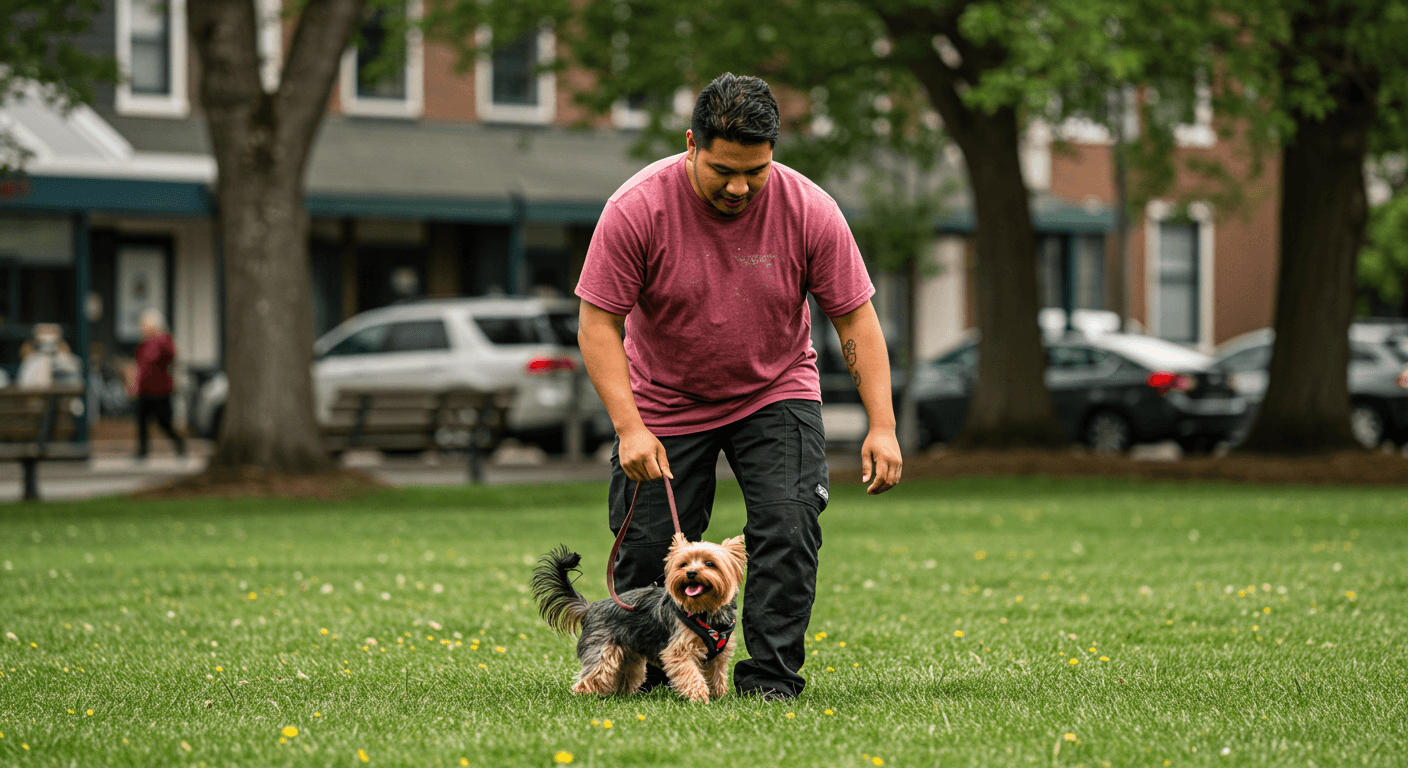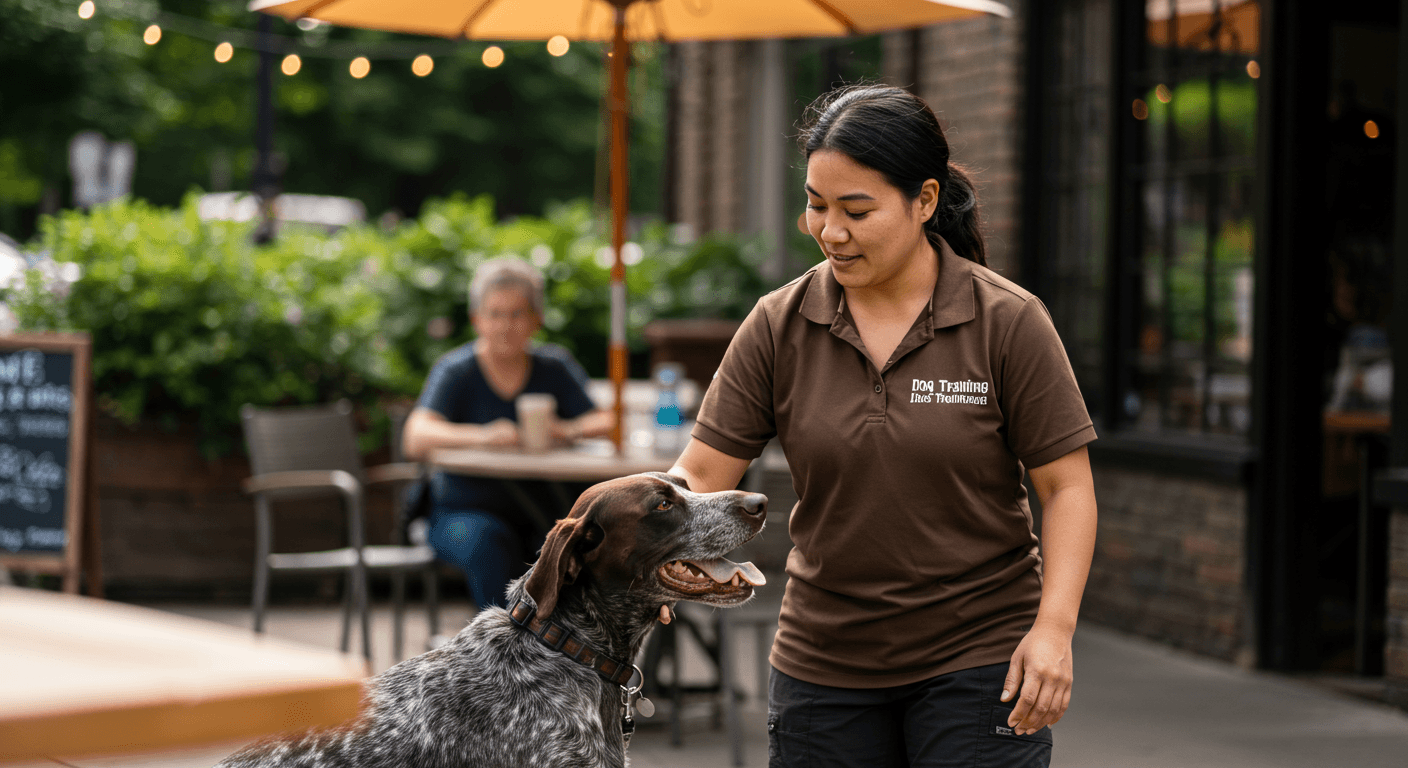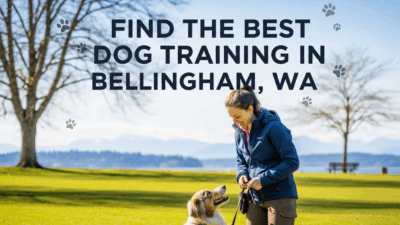Your Complete Guide to Choosing a Dog Trainer in Bellingham, WA and Surrounding Areas
Living with a dog in Bellingham means balancing the city’s outdoor lifestyle with practical training needs. Your dog needs to walk calmly through bustling Fairhaven, stay focused at Boulevard Park when paddleboarders and kids are everywhere, and handle the constant activity around Western Washington University without pulling or reacting. Finding the right professional dog trainer helps you build those skills while enjoying everything Whatcom County has to offer.
Bellingham’s mix of urban neighborhoods, trail access, and active dog culture means your training program should prepare your dog for real-world situations. Whether you live in the busy downtown corridors near Railroad Avenue or the quieter residential streets of Birchwood, your dog will encounter cyclists, off-leash dogs, wildlife, and crowded weekend markets.
How to Choose the Right Trainer
Start by identifying what you actually need. Puppy training looks different from fixing leash reactivity, and both require different approaches than preparing a service dog for public access work. A good trainer will ask detailed questions about your daily routine, your dog’s specific challenges, and your goals before suggesting any training sessions.
Look for someone who uses positive reinforcement training and can explain their methods clearly. This approach builds trust while teaching your dog to make good choices, which matters when you’re navigating crowded spaces like the Bellingham Farmers Market or waiting outside shops on Holly Street.
Credentials give you a starting point for comparing experience levels. Common dog trainer certifications include CPDT-KA, KPA-CTP, or IAABC-CDBC for serious behavior problems. If your dog shows aggression or intense fear, look for someone with CBCC-KA or another science-based credential like CTC.
In-home dog training works well for issues that happen at your house, like door manners, jumping on guests, or separation anxiety. Group classes make sense once your dog can focus around other dogs and distractions. Private lessons give you flexibility to work on specific challenges in the environments where they actually happen.
Ask about the trainer’s experience with Bellingham’s unique situations. Does their training program include work around busy coffee shop patios? Can they help with recall skills near the water where seals and herons are common distractions? Do they understand the challenges of navigating narrow trails during peak hiking season?
Common Dog Training Methods Explained

Reward-based methods create lasting behavior changes while keeping training enjoyable for both you and your dog. These approaches also help you follow Bellingham’s leash laws and noise ordinances without relying on fear or intimidation.
Basic obedience covers sit, down, stay, place, recall, and leash training so your dog can handle everyday situations. These foundation skills matter when you’re trying to enjoy a meal at an outdoor table or waiting for the bus on Samish Way.
Puppy classes focus on socialization, potty training, bite inhibition, crate training, and early leash manners. Starting early prevents bad habits from forming and helps your puppy learn to handle new experiences calmly. Bellingham’s active dog community means your puppy will encounter lots of other dogs, so proper socialization during those critical early months makes a real difference.
Behavior modification addresses fear, reactivity, resource guarding, or aggression through careful desensitization and counterconditioning. For complex cases, ask whether your trainer collaborates with veterinarians or veterinary behaviorists. This level of training for dogs with serious issues requires patience and expertise.
Private lessons and coaching let you customize everything around your schedule and your dog’s specific needs. Day training can speed up progress when you’re working full time, since the trainer works with your dog during the day and then teaches you how to maintain the skills.
Dog training classes help your dog practice good manners around other dogs and people. The best group classes screen participants carefully, give dogs enough space to learn without feeling overwhelmed, and focus on building calm, polite behavior rather than just excitement.
Specialized programs like therapy dog training or service dog training require extra structure, careful public-access preparation, and clear step-by-step goals. These programs take months of consistent work and should include proofing in real-world Bellingham locations.
Stay away from trainers who use shock collars, prong collars, or intimidation to get results. Humane methods are safer, easier to maintain long-term, and much better for keeping peace with your neighbors in Bellingham’s close-knit communities.
Average Cost of Dog Training in Bellingham, WA (Updated for 2025)
Prices around Bellingham and Whatcom County depend on the trainer’s experience, session length, and whether you choose in-home visits or group settings. Here’s what most local dog owners are paying in 2025.
| Service Type | Average Cost (Bellingham/Whatcom County) |
|---|---|
| Puppy classes (4-6 weeks) | $140-$260 total |
| Group obedience classes (4-6 weeks) | $150-$290 total |
| Private lessons (60-90 min) | $100-$180 per session |
| In-home coaching packages (4-6 visits) | $400-$850 total |
| Day training (trainer works your dog + handoff) | $425-$900 per week |
| Behavior consult for reactivity/anxiety (initial) | $140-$240 |
| Board and train (2-4 weeks) | $1,900-$4,200 total |
You’ll probably pay extra for travel to areas outside central Bellingham, and expect higher rates for aggressive dog training or complex behavior modification work. Some trainers offer a free consultation or free evaluation to discuss your needs before you commit to a full training program.
Make sure you understand what’s included, how the trainer tracks progress, and whether follow-up support is available after the initial sessions end.
Questions to Ask a Potential Dog Trainer
- What training methods do you use, and how do you keep sessions positive and low-stress for my dog?
- What credentials do you hold, like CPDT-KA, KPA-CTP, or CPDT-KSA? How do you stay current with new research and techniques?
- How will you customize the training program for my dog’s specific needs and our Bellingham lifestyle?
- Do you offer in-home visits, group classes, or day training, and which approach fits my goals best?
- How will we measure my dog’s progress and know when to add more distractions?
- What are the total costs, including any travel fees, and what’s your cancellation policy?
- Do you carry liability insurance, and can you show me proof?
- For behavior problems, will you work with my veterinarian or recommend a veterinary behaviorist if needed?
- What should I practice between sessions to help my dog keep improving?
- Have you worked with dogs in Bellingham’s specific environments, like busy waterfront areas or narrow shared trails?
Local Bellingham Rules and Considerations
Bellingham enforces leash laws and noise ordinances to keep parks and neighborhoods safe for everyone. Whatcom County and Washington State also have specific requirements for dog owners.
Leashes are required in all public spaces except inside designated off-leash areas. Keep a standard 6-foot leash with you for city parks, downtown sidewalks, and the Interurban Trail. Retractable leashes don’t give you the control you need in busy areas.
Washington State law requires current rabies vaccination for all dogs, and Bellingham enforces this requirement. You’ll need proof of vaccination and a current rabies tag on your dog’s collar. Check with Whatcom County Health Department for local clinic schedules and requirements.
Excessive barking can lead to complaints and potential fines, especially in Bellingham’s denser neighborhoods near downtown and Fairhaven. Work with your trainer on alert barking and separation anxiety before issues escalate with neighbors.
If your trainer wants to use city parks for commercial dog training services, they may need permits and proof of liability insurance from the City of Bellingham Parks and Recreation Department.
Washington State doesn’t require special licenses for dog trainers. However, if a trainer operates a boarding facility as part of board and train services, they may need to follow kennel licensing requirements through local zoning and business regulations.
Whatcom Humane Society provides resources for lost pets, low-cost vaccination clinics, and community support for dog owners throughout the county.
Local Bellingham Resources for Dog Owners
These spots give you great places to practice polite manners, work on recalls, and provide safe enrichment for your dog. Always follow posted rules and pick up after your dog.
- Whatcom Falls Park Dog Park offers a fully fenced off-leash area with separate spaces for small and large dogs. The park gets busy on weekends, so try visiting during weekday mornings for quieter practice sessions.
- Cornwall Park Dog Off-Leash Area provides another fenced option for safe recall practice and socialization. The surrounding Cornwall Park trails are perfect for leashed training walks.
- Zuanich Point Park Dog Off-Leash Area near the waterfront gives you water views and plenty of space for training. This location can be windy, which makes it good for working on focus around environmental distractions.

FAQs
How much does in-home dog training cost?
Most Bellingham trainers charge $100-$180 per in-home visit, with package discounts available when you commit to multiple sessions. Behavior modification for reactivity or aggression typically starts at the higher end of that range.
Is in-home dog training worth it?
Absolutely, because you’re addressing problems exactly where they happen. Your trainer can fix door manners, jumping on guests, counter-surfing, and reactivity to neighbors right at home, then step outside to practice leash skills on your actual neighborhood sidewalks and trails.
Can you pay someone to house train your dog?
Yes, many trainers offer puppy training programs that include potty training, crate routines, and daily schedules. Day training can speed up the process while teaching you how to maintain the progress yourself.
What is the 3-3-3 rule for dog training?
This guideline helps set realistic expectations for new or adopted dogs: expect about 3 days for your dog to decompress, 3 weeks to learn your routines, and 3 months to feel completely settled. Good training programs work with this natural adjustment period rather than rushing through it.
How long will it take to reach my training goals?
Most puppies and friendly adult dogs show solid progress within 4-8 weeks if you practice daily. Fear, reactivity, or separation anxiety typically requires several months of careful behavior modification with gradual increases in difficulty. Your expert dog trainers should give you realistic timelines based on your specific situation.
What should I bring to group classes?
Pack a flat collar or harness, a 6-foot leash, high-value treats, water, and current vaccination records if your trainer requests them. Leave retractable leashes at home for safety reasons. Bring a towel if you’re attending classes during rainy season, which is most of the year in Bellingham.
What’s the leash law in Bellingham?
Dogs must be leashed and under control in all public areas, except inside designated off-leash dog parks. Keep that 6-foot leash handy for city parks, downtown sidewalks, the waterfront, and all trail systems. Even well-trained dogs should stay leashed outside of designated areas.
Do I need a dog license in Bellingham or Whatcom County?
Yes, Bellingham requires annual dog licenses for all dogs over six months old. You can register through the City of Bellingham online system or in person. You’ll need proof of current rabies vaccination to complete the license application.
What shots does my dog need in Whatcom County or Washington State?
Rabies vaccination is required throughout Washington State. Your veterinarian may also recommend distemper-parvo, bordetella, and sometimes leptospirosis depending on your dog’s lifestyle and exposure to wildlife. Check current guidelines through the Washington State Department of Health.
Are dog trainers required to be licensed in Bellingham or Whatcom County or Washington State?
No special trainer licenses exist in Washington State. Trainers follow normal business regulations, but certification from recognized organizations helps you identify qualified professionals. If they offer boarding as part of their dog training services, their facility may need to meet zoning and business licensing requirements in Bellingham or Whatcom County.
Where can I practice off-leash recall?
Use Bellingham’s three designated off-leash dog parks: Whatcom Falls Park Dog Park, Cornwall Park Dog Off-Leash Area, and Zuanich Point Park Dog Off-Leash Area. These fenced spaces let you practice safely and legally. Try visiting during quieter hours when you’re starting recall training.
Which dog parks allow training around Bellingham?
All three of Bellingham’s designated off-leash areas allow training within their fenced boundaries. Whatcom Falls Park Dog Park, Cornwall Park Dog Off-Leash Area, and Zuanich Point Park Dog Off-Leash Area are your best options for practicing recalls and socialization skills in controlled environments.
What beaches or trails allow dogs for training?
Bellingham offers several dog-friendly beaches and trails, though dogs must stay leashed. Clayton Beach at Larrabee State Park welcomes leashed dogs and provides excellent opportunities for distraction training around tide pools, other beachgoers, and marine wildlife. The Interurban Trail and Railroad Trail both allow leashed dogs and give you miles of training space with varied environments. Lake Padden Park welcomes leashed dogs on trails around the lake, perfect for building focus around runners, cyclists, and other dogs.
How do I help my dog become well-behaved in Bellingham’s outdoor spaces?
Start with basic obedience in low-distraction environments, then gradually work up to busier locations. Practice leash skills on quiet residential streets before trying crowded waterfront paths. Your certified dog trainer can help you create a progression plan that builds your dog’s confidence and focus step by step. Consistency matters more than speed, especially when you’re working toward a well-behaved dog who can handle Bellingham’s active lifestyle.
What should I do if my dog is reactive to other dogs on trails?
Work with a trainer who specializes in reactivity and behavior modification. Start by increasing distance between your dog and triggers, using high-value rewards for calm behavior, and gradually decreasing distance as your dog’s emotional response improves. Many of Bellingham’s trails are narrow, so you may need to start training in parking lots or quiet streets before moving to actual trail environments.
The right combination of humane methods, consistent practice, and realistic expectations will help your dog become a confident companion throughout Bellingham and surrounding areas. Whether you’re working on basic manners or addressing serious behavior challenges, choosing a professional who understands both effective training techniques and local conditions makes all the difference.
